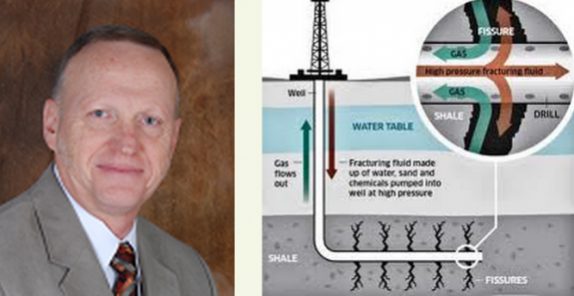Energy & Clean Tech Series
What are the real risks? Hear first-hand from expert, George King, P.E.! One time only Bay Area appearance!
George King, P.E.

Dinner: 6:30-7:30pm
Program: 7:30-9:30pm
Please note later start time!
Register
$30 MITCNC members; $45 non-members
Join the Club! Buy your MITCNC membership HERE (MIT alums only)
Program
- How does hydraulic fracturing work?
- Can chemicals in fracturing fluid contaminate fresh water supplies?
- Can we recycle all the waste water and other fluids from fracturing?
- What can prevent methane escaping into the atmosphere?
- Can fracturing cause earthquakes?
- How might focusing on the real risks shift the regulatory discussion?
The Monterey Shale deposit in California is estimated to hold 15.4 billion barrels of oil, making it the largest shale deposit in the U.S. Since 2011, over 1,250 wells have been drilled and completed using hydraulic fracturing.
Earlier this year, Governor Brown signed into law the controversial bill SB4 that allows oil and gas companies to continue with fracking in California, but under tight regulation.
Critics worry about water and air pollution and the worsening effects on global warming, while the oil and gas industry touts the benefits that hydraulic fracturing will bring to the California economy.
So - is this a good thing or a bad thing? Come hear George King describe the real risks of hydraulic fracturing so that we can steer the conversation in the right direction.
George E. King
George E. King is a registered professional engineer in multiple states with 42 years of worldwide oil and gas industry experience in most aspects of well construction and failure analysis. His work has focused on fracturing, well construction risk analysis, unconventional formations, sand control, and perforating.
George holds a Chemistry degree from Oklahoma State University and a BS in Chemical Engineering and an MS in Petroleum Engineering from the University of Tulsa. He was awarded the 2012 Engineer of the Year from the Texas Society of Professional Engineers and the 2004 Society of Petroleum Engineers Production Operations Award. He has written 68 technical papers, journal articles and book chapters.
Questions? Please contact Pauravi Shah - pauravi@alum.mit.edu
- Log in to post comments
